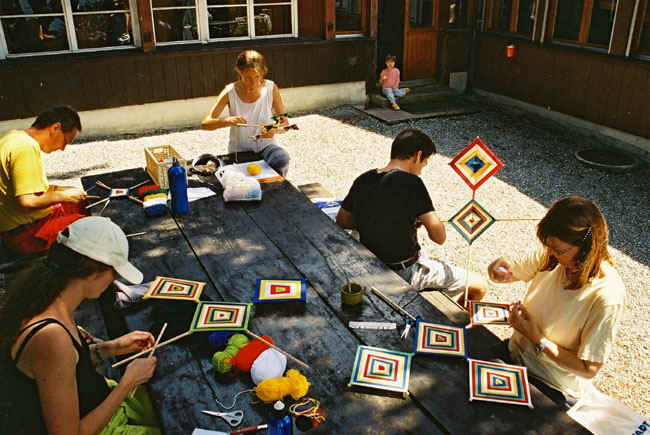
Namkha
conjuring with the warp and weft of the elements
Namkha derives from the ancillary Mahayoga section of the Aro gTér. A namkha (sky-weaving) is composed of threads wool or silk which are the colours of the five elements: blue, green, red, white, and yellow – space, air, fire, water, and earth respectively.
Ngak’chang Rinpoche comments: These threads symbolise the ‘thread’ that is
the literal meaning of the word ‘tantra’ and describe the manner in which each
point in time and space is the warp and weft of the loom of experiential /
existential emptiness.
The threads are woven around a matrix of wooden dowels (srog shing) in a form which displays the basic kyil’khor (mandala) of the elements. The practice of Namkha links our rTsal (externally manifesting energy) with the energy of the five elements. Each elemental colour is associated with a particular experiential stylistic, and represents either the ‘increase’ of non-dual elemental vector or the ‘decrease’ of a pattern of dualistic derangement.
In this practice one observes one’s personal situation and evolves an intuitive notion of which experiential, emotional, or circumstantial manifestation one wishes to increase or decrease via the symbolic structure of the namkha. One then recites the mantra appropriate to the elemental thread one is weaving (red, white, red, green or blue) around the srog shing matrix. There are a variety of forms that can be woven. This photograph illustrates a basic form, with skies (diamond shaped sections) representing each of the five elements.
Khandro Déchen says of namkha: This is a Mahayoga method of harmonising the
energy of our experiential, emotional, and circumstantial personalities. Through
the practice of winding a woven matrix of threads—empowered through
awareness-spell—we may subtly shift our experience of being in ways which
profoundly alter our everyday experience.
